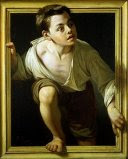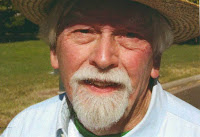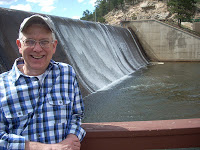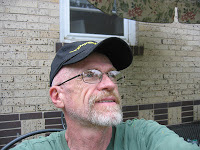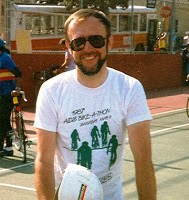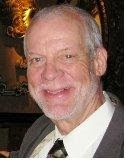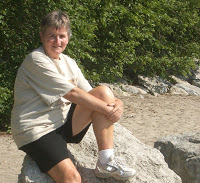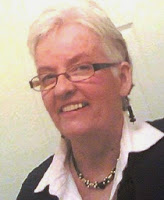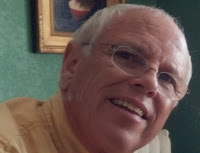why. There are several reasons that led
to his preoccupation with having enough food to eat and enjoying it.
He had very little to eat as a boy in Georgia and probably went hungry
quite often. Although his father was
undoubtedly very intelligent (he could quote passages from the Bible merely
from having heard them at church), he was illiterate and could find only menial
work, which brought in very little money.
They lived in a pre-Civil-War-era house without electricity and
sometimes had only collard greens for supper.
As a growing boy, this lack of food frequently must have preyed upon
James’ mind.
and ate very little. Probably the first
time he had a square meal was when he joined the Air Force. Although he, at last, did not go hungry,
military chow doesn’t have a great reputation.
It wasn’t until after he left the service and used the G.I. bill to
begin college that serendipity set him upon a path to learning about good
quality food, prepared well.
elegant hotel and sat down to study his French.
In walked a well-dressed, older gentleman who immediately took notice of
James. Did I mention that young James
was stunningly handsome, enough to turn heads?
Well, he certainly did with Monsieur Charles Bois de Chêne, millionaire
from Lausanne, Switzerland. Charles spoke to James in French, who also
replied in excellent French, James having inherited somehow an innately
brilliant mind and could learn rapidly.
A strong friendship rapidly progressed to the point that Charles decided
to take James with him to Switzerland and France so James could gain greater
experience speaking French.
Charles to operas and ballets, afterwards being taken to meet the casts. They attended the exclusive Cannes Film
Festival. And central to this story, he
certainly learned a lot about proper preparation and presentation of food. This understanding and interest in food
stayed with him throughout the rest of his life.
five-star resorts along Lake Como.
Whenever they came across one of the famous French pâtisseries with
their all-too-tempting pastries, they indulged themselves so much that James
became concerned that those pastries easily could turn him into a cochon de
lait, or ”suckling pig,” the French idiom for someone who has become
rather chunky. And, when they were in
Paris, they dined at the world-famous Hotel Ritz, where James came to truly understand
haute cuisine.
in cooking fine meals. I know that I
have a natural instinct for knowing how to cook, and I have done so on
occasion; however, I never cared much for taking the time. Before I had met James, I generally prepared
simple meals for myself. Then after
James and I moved in together, James’ preference was to do the cooking, so I
generally assisted only as a sous chef, except when I was inspired to
create a favorite dish of mine.
that there remained a residual emotional scar from childhood when there was
virtually no food in his family’s house.
As a consequence, he always made sure we had a full larder, including a
large pantry, extra storage on basement shelves, and in a large freezer in the
basement.
the years, such as a Cuisinart food processor, enameled, heavy-iron Le Crueset cook-pots, the best quality
mixer, Chinese woks, bread-maker, pasta-maker, crystal wine glasses, and a
large set of stoneware dinnerware. While
we were together, we enjoyed hosting dinner-parties. For a while, after he died of lung cancer, I
tried occasionally to continue that practice, but I finally lost heart and
suspended the practice.
with a plastic cover. I also covered the two dozen cook books. The plastic covers have remained there now
going on twenty years. An acquaintance
coveted my expensive Cuisinart and asked to buy it for only $20. Because she supposedly is a friend, I agreed
and let it go for that. Most of the
professional Le Crueset pots went in
a garage-sale. Other pots and pans
remain, dust-covered, in the bottom drawer of my stove. I have little interest in drinking wine, and
few people come to my house, so the crystal wine-glasses remain in the buffet,
unused.
sandwich, or occasionally cook something simple on the stove-top. The oven hasn’t been on in years. I just don’t have the interest in preparing
varied and interesting meals just for myself.
Perhaps the most used appliance in my kitchen is the old microwave. Sometimes I think that, if I didn’t have a
microwave, I’d starve.
that I often have modest meals with friends out in various restaurants, nothing
fancy, just basic food. And, that’s not
so much because of being able to order varied food which I don’t wish to bother
making for myself. It is because of the
good company with my friends, which is especially important in my life right
now.
19 May 2016
Author
people and their life stories. I also
realize that, although my own life has not brought me particular fame or
fortune, I too have had some noteworthy experiences and, at times, unusual
ones. Since I joined this Story Time
group, I have derived pleasure and satisfaction participating in the group. I do put some thought and effort into my
stories, and I hope that you find them interesting.
